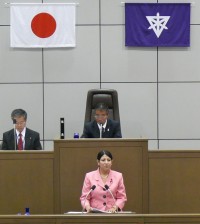- Belgium comes to Yamashita Park
- Residential Villa in Phuket Entices Remote Workers With Long-Stay Rates
- Rare pieces of French glass art at the Mirai Museum of Art
- Feast on fresh fish and seafood at the 2024 ‘Sakana’ Festival
- Would you like to ride in a Louis Vuitton gondola lift?
- Naked Snow Aquarium
- Festive lights at Yomiuriland will get you feeling the holiday vibes
Hip Hok
 The dance world is filled with an infinite variety of styles and all sorts of performers. One such man is Hokuto “Hok” Konishi, who has made a name for himself by participating in So You Think You Can Dance, a popular American dance reality show created by the producers of American Idol.
The dance world is filled with an infinite variety of styles and all sorts of performers. One such man is Hokuto “Hok” Konishi, who has made a name for himself by participating in So You Think You Can Dance, a popular American dance reality show created by the producers of American Idol.
The 22-year-old who has trained in both hip-hop and breakdancing is very diverse — much like the art itself. Born in Tokyo to a purely Japanese family, Hok currently resides in California, but grew up in the UK. He was previously a member of SickStep, a dance crew that has been involved in various music videos, films, and both television and awards shows. Prior to succeeding on So You Think You Can Dance in season three, Hok had auditioned twice before: he almost made it past auditions on his second try, but was unable to continue due to being ineligible to work in the US. He returned the following year with a working permit in hand, and was victorious as one of the show’s top 20. He currently acts as head of break-dance troupe Quest.
Sporting his newly colored half-purple hair while keeping his trademark Mohawk and braids, Hok came back to his hometown for a short while, and I was fortunate enough to get to hang out with him.
So Hok, what brought you back to Japan?
First and most importantly, I had to renew my visa because it expired in January. I live in LA, my sister lives in Washington DC, and my parents live in Tokyo. Last year, I wasn’t really able to spend time with them so I just wanted to come back and spend quality time together. That, and of course, I got a job doing promotions for FOX Japan. I’m also dancing. I actually entered a dance battle two days ago in Saitama. We won!
You were a fan favorite on So You Think You Can Dance because people found you to be edgy, yet congenial and polite. How do you manage to have both a cool and a clean image?
Well, I don’t know if I have a cool and clean image [laughs], but I definitely think that I might be a little different from a lot of people actually, because obviously my blood is completely Japanese but I talk like an Englishman. I learned the respect and politeness by doing martial arts. It always starts with a bow, and this is all about the respect. So I think it’s just the combination of how I grew up.
It’s great how you take the positive things from all of your cultures.
I actually hated being different growing up, because when I was little and went to England, I was the only Japanese guy at my school. Everyone else was white. I just wanted to be the same as everybody else and not stand out in a weird way. Then, when I was 12, I went back to Japan, and I thought I could blend in. But even though I look the same, because I had a different background and my Japanese was a little different, they saw me as a “gaijin” and I really didn’t like that either. Then finally, I went to LA, where everyone is different. They have different backgrounds, beliefs, religion, language—everything. That was the first time that I was able to feel that I could be proud of what I am.
You created a stir in the competition as an excellent dancer in the US, the UK, and Japan. At what age did you start having a fascination with dance?
I first started dancing when I was 15. Before then, I had nothing to do with dance whatsoever! My sister actually did ballet when she was little, and I would always have to wait in the car for her to finish her class. I really didn’t like ballet just cuz of that! When I was 15, my father watched a Japanese dance program and he taped it for me. The moment I saw it, I really don’t know how to explain it, but it was a really big shock. I just thought that it would be such a shame for someone to end their life without experiencing it. It’s just like how you would like anyone to go on a roller coaster at least once in their life, because you can’t explain that — you just have to experience it. From that time on, I just thought I would train, become good, and then one day become the guy who delivers that feeling to people all over the world.
How do you view the Japanese’s expression of dance as an art?
There are so many good people in their own specific fields. I think Japanese people tend to get like that — even with games, anime, and electronics. When it’s their field, they go to the extreme. I want more people to open up to more of the other styles, and bring it up to the level where it’s a natural performance that you could even show to people who don’t understand dancing at all. I think it’s a very closed dance community right now. They can critique each other, but when they show it to people outside, they don’t really get it. I would really like to get more dancers to open their eyes up to other performances so they can take it in and improve their dancing.
So what does art mean to you?
That’s a massive question again! To me, I think art is a way to express one’s life. What I really love about it is that… say, for example, I get really mad or angry or sad — rather than sitting by myself in my room, doing nothing, I would rather use that emotion and create something. Even though it may be a negative thing, if you use it in a bright way, I think anything can become positive. Even though there might be someone with the same skill level as me whether in painting or dancing, they’ve had a completely different life to mine so they would express it in a really different way. I think that’s what makes art exciting.
How do you want to be remembered as a dancer?
I wasn’t ready for that! I would like to be remembered as a different kind of dancer. There are so many dancers in the world and in history, but if it’s the same kind of style they blur into each other. It might be technically or in character, but I would like to stand out as being very different. I want to take the Japanese tradition in art or dancing, and also take the English side and mix it together, and on top of that, add my experience from my life and make it something completely original and unlike anyone else.
A lot of teens—particularly in Japan—face a lot of peer pressure into blending in with everyone else. How do you maintain your own identity and separate yourself from the crowd?
I think there is no need to blend in with everyone else. Just like what I learned from my experience, sometimes you have no control over standing out among the others. It is really hard, and sometimes you get bullied, but you have to think and understand that it really is not a negative thing. I saw this quote while I was on tour — it was a sticker — and it said, “Everyone laughs at me because I’m different, but I laugh at everyone because they’re all the same.” I thought, that’s really true! You can use the fact that you’re different in a better way – to help society or yourself — and things won’t seem that hard anymore. It’s really natural for me to try to do things that people don’t, just because although at first I really did want to be the same, I realized that some things you just have to accept. From then I was just like, “Well, if I’m going to be different, I might as well be really different.”
If you could go back in time and be a part of any music video ever made, which would it be?
[Laughs] First of all, if I could have been in any Michael Jackson music video, that would honestly have been a dream come true.
I actually thought you’d say Michael Jackson!
You wouldn’t guess my second answer, though. My second answer has to be Wannabe by the Spice Girls. Hey, don’t hate! I really loved that song when I was 12. I think I would be one of the Spice Girls. [Laughs] I’d be the Asian Spice.
Last question—do you have any message for teens?
Even if you’re different and going through some hard times, everything is about perspectives. When you look at things, instead of just looking at the bad things, change the perspective and you can see a completely new world. A bad thing could become a good thing. To people who have dreams, I would say: Go for it! You only have one life!
So You Think You Can Dance: Season 3 Encore starts Mar 3, Mon to Fri
at 25:30 on FOX.
















